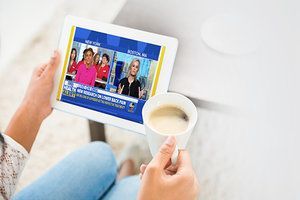It’s a new year and many chiropractors are evaluating what will enhance their respective practices, particularly as it relates to their bottom line. One of the most common questions I get is: “Do I need to be credentialed to bill insurance, and what are the best plans to join?” It’s a loaded question – but one every DC ponders. Whether you're already in-network or pondering whether to join, here's what you need to know.
Waking Up to the Right Way to Treat LBP
A collection of papers published in The Lancet that highlight the global impact of low back pain, the ineffectiveness of current medical treatments and the value of spinal manipulation and other nondrug options before turning to NSAIDs is receiving substantial media attention. One of the brightest spotlights: a "Health Alert" segment on "Good Morning America" captioned "New Research on Lower Back Pain: Are Millions of People Getting Ineffective Treatment?"
"GMA" anchor Robin Roberts opened the segment with this statement to the show's estimated 4.5 million viewers regarding lower back pain: "As many as 540 million people suffer from it. According to new research, many treatments, [including surgery and pain medication] ... could be all wrong."
She then introduced Dr. Jennifer Ashton, chief health and medical editor for the show. Dr. Ashton, who described the papers as the "magnum opus on low back pain" and The Lancet as "very reputable," said the material "[draws] attention to the massive gap between evidence-based medicine and what's really going on" when it comes to the treatment of back pain.
According to Dr. Ashton, reporting on the papers, back pain is a "massive global public health burden." First-line treatments include staying active ("the worst thing you can do is get in bed") and education: learning "what works and doesn't from reputable sources." Second-line treatment options (Dr. Ashton urged viewers, "This is really what I want people to pay attention to") include superficial heat, spinal manipulation, massage and acupuncture. [Italics ours]

Dr. Ashton added that NSAID medication is also considered a second-line treatment according to The Lancet papers, but should be utilized "only if the other things are not working."
The Lancet content on lower back pain, published online on March 21, features two "series" papers, a "viewpoint" and a "comment," all of which are available in full-text format free of charge on the journal's website:
- "What Low Back Pain Is and Why We Need to Pay Attention" (Series 1) (Hartvigsen J., et al.)
- "Prevention and Treatment of Low Back Pain: Evidence, Challenges and Promising Directions" (Series 2) (Foster N.E., et al.)
- "Low Back Pain: A Call for Action" (Viewpoint) (Buchbinder R., et al.)
- "Low Back Pain: A Major Global Challenge" (Comment) (Clark S., et al.)
The "GMA Health Alert" on LBP is also available online in its entirety, and can be accessed by clicking here. To access the Lancet content, click the links above.



